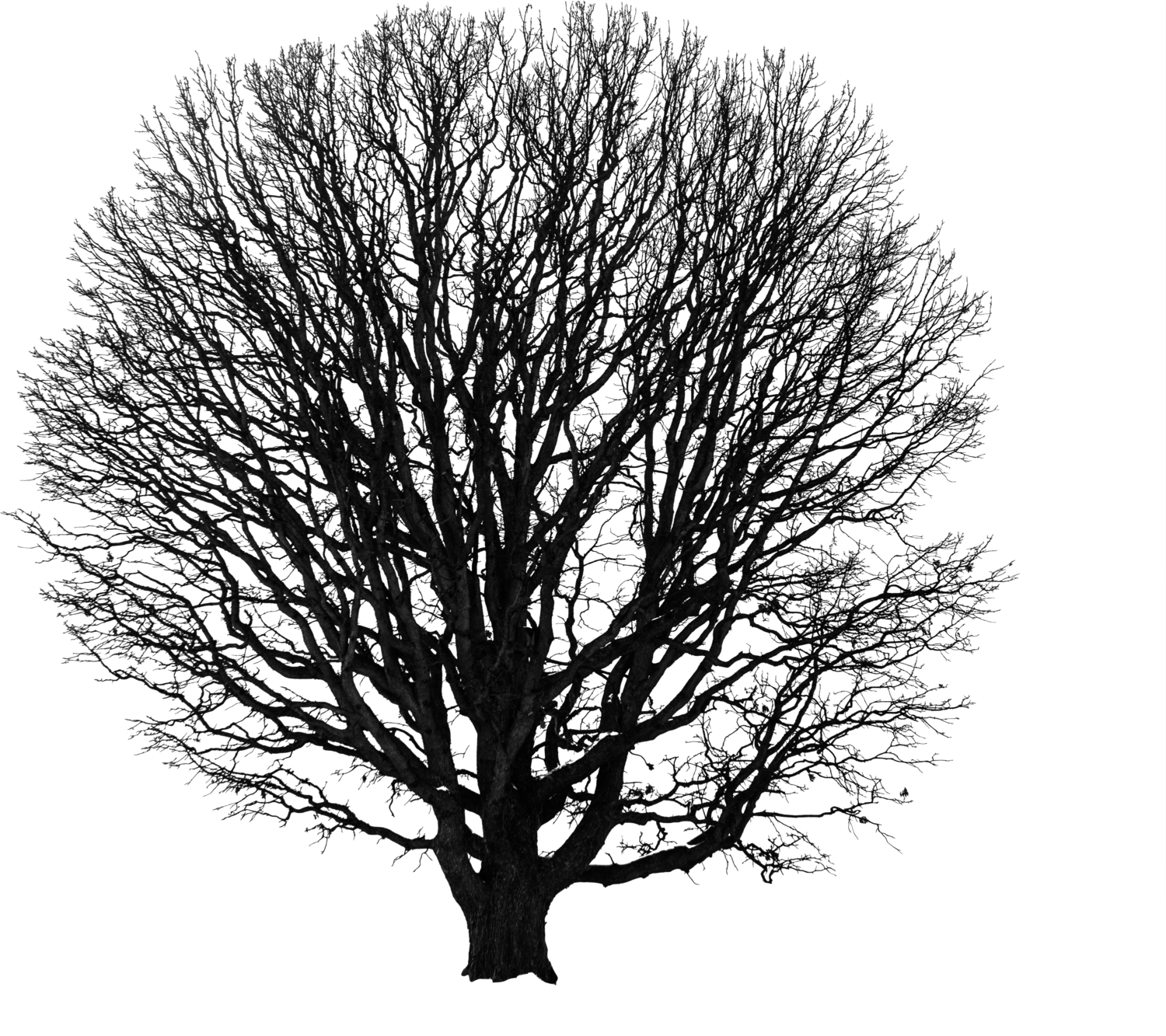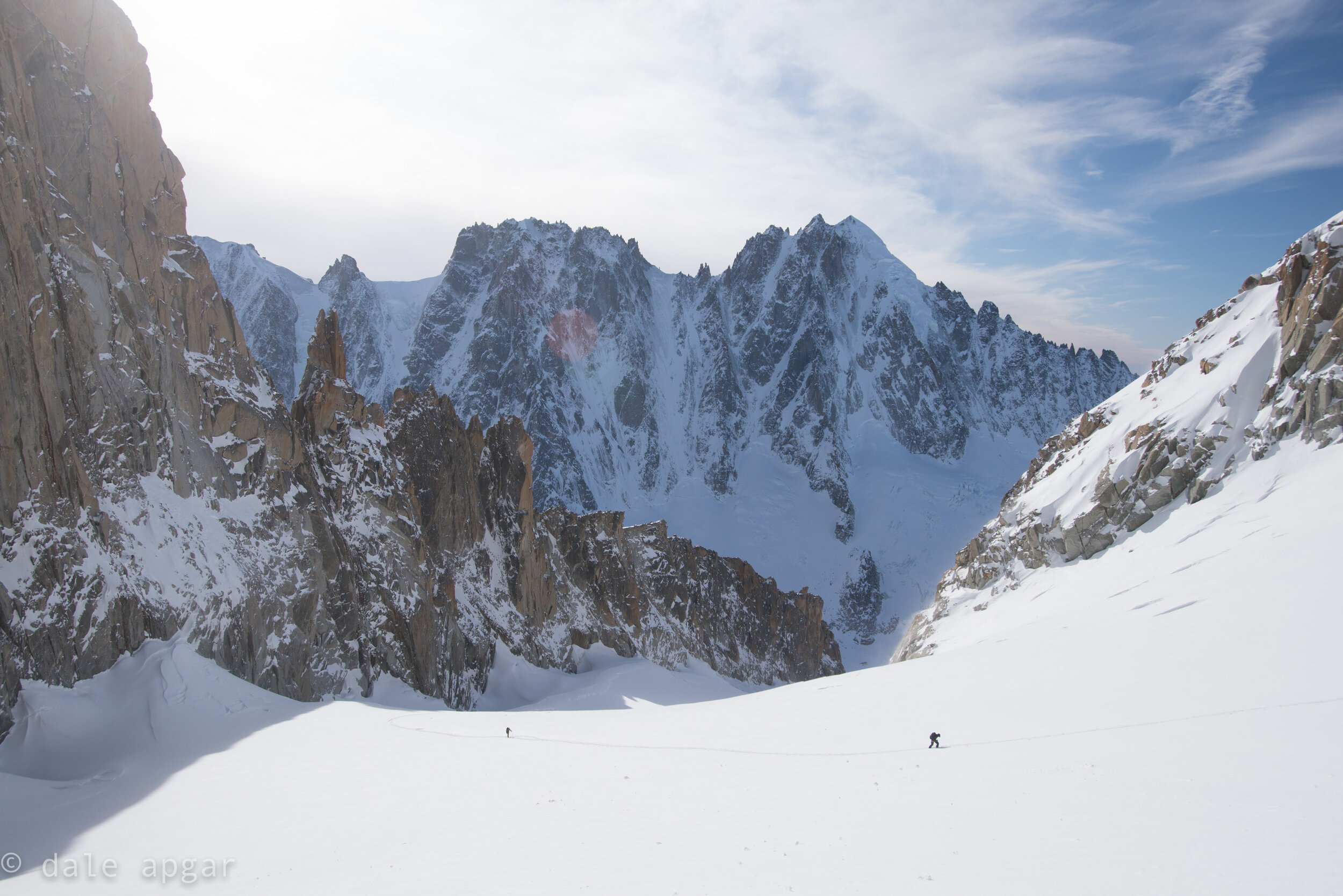Setting the skin track on Glacier du Milieu
Nobody needs a reminder of the campaign slogan shouted by the commander in chief and his fervid followers, but many perhaps missed the question during his 2016 campaign: What is it that makes America great in the first place? Irregardless of era, people can point to periods since the country’s formal inception where our government and its citizens did things that made us great; but cynics are eager and correct to point out how those same periods existed simultaneously with blemishes on our collective conscious.
To name just a few, World War II and our assistance to help crush Nazi Germany coincided with Jim Crow laws suppressing the rights of our own citizens. We’re only celebrating the centennial of female suffrage this year, and it took a Republican administration under a corrupt president to create environmental policy preventing our rivers from catching fire from all the pollution we put in them. Throw in the fact since the first Europeans set foot on North America, we’ve repeatedly reneged treaties with Native Americans granting them property and sovereignty and instead of honoring our own policy, we push them onto smaller and smaller reservations when we find anything to exploit on land already given. Other examples abound, and they’re not just restricted to history: current protests reveal we still have a systemic racist problem, and female equality is not universal.
All of a sudden the sterling image of our union and the notions that the US is perhaps ‘the greatest nation in the history of the world,’ are irrevocably debased. The belief that there was some bygone era in our past where we were greater than we are today is a myth, subject to the inevitable airbrush of history we so often spray on the less savory parts of our history to make us feel better about ourselves in the present; “If we can just get back to how we were at that time, everything will be all right.” Balderdash.
“Nostalgia is denial. Denial of the painful present. The name for this fallacy is called Golden Age thinking. The erroneous notion that a different time period was better than the one one’s living in. It’s a flaw in the romantic imagination of those who find coping with the present too difficult.”
This is not to demean generations before us who selflessly put their lives in harms way to give us the freedoms and luxuries we take for granted, or those who more simply strove to raise a loving family and ensure the next generation was better off than their own. We all stand on the shoulders of giants, and there are virtues in our predecessors we should admire and strive to recreate in our own lives, but more important than the punch line and rose-hued images of our past is the thoughtful consideration of our history, and how we all share the responsibility to learn from it in order to make our own America as great as it can be.
Fun turns in the Couloir Pissoir
Inquire with anyone who resides in this country, and undoubtedly they will have their own answers for what makes America great, but increasingly - and brought to life in the past couple years - there are many examples of things that we need to work on - parts of our country that make us far from great.
And so it is interesting to dive into the true history of America’s founding, to read about what was happening during the times of the American Revolution, what led to the writing of the Declaration of Independence, and Constitution and to put America’s prowess, stature and past into greater context. Many great biographies exist on our founding fathers - the men who gave us the footing of our country, and the more one reads about the true lives they actually lived - without the revisionist, polished history giving us carved heads on mountains, busts on currency and monuments of marble yielding a glint of the ‘greatest nation’ - the more we discover that they, like us, were flawed people.
Most recently, the reader is recommended to postpone a viewing of the Hamilton musical and read Chernow’s biography on a brilliant member of our original leadership. A fascinating part of the history of Alexander Hamilton was how he represented the epitome of what makes America great: he was an immigrant, a self-made man who and came to love his adopted country and it’s fledgling government so much, he dismissed the promises of wealth and comfort to keep his vision for the country alive.
Aiguille de la République forming the backdrop to a midday backcountry session above the Mer de Glace
The facts about Hamilton make his personal history all the more significant - born to a philanderer in the West Indies during a time when pedigree dictated one’s progression through life, he built himself up from virtual squalor. He worked in a mercantile office in the islands and took every spare chance available to educate himself, and when the fruits of his fledgling labor caught the eye of the right people, he got a break to go to New York and study at King’s College [now Columbia] with some support from his cousin.
An opportunist who was convinced about the cause for American Liberty, while studying at Kings, he became involved in the growing revolutionary wave, and when the institution was converted to an army hospital, he enrolled in the army. Within a year he was asked to be part of General Washington’s war cabinet, and from that appointment in January 1777 until his death, his contributions to the country became legendary.
The rest of the details are worthy reading in the book, but the major themes from his biography stand out -
A disciplined, self-motivated autodidact from humble beginnings:
In his youth, he was ill with yellow fever at the same time, in the same bed as his mother, and watched her die as he nearly died himself. Soon after his brush with death, he and his fellow orphan brother helplessly looked on as creditors and his late mother’s first husband carted off whatever belongings they had in what amounted at the time to a divorce ‘settlement.’
Hamilton only had two years of college before he enrolled in the army, and prior to that, he did not have the benefit of an aristocratic or privileged upbringing. He taught himself, pooling whatever literary resources were available at the time to backfill the gaps of his knowledge to meet whatever need was required of him and his nascent republic; at different times, it was learning the details of military theory and strategy to best lead the revolutionary army against the British, then the legal and political framework of the jettisoned imperialists and other European powers to give structure to American governance and to become a lawyer, then commerce and economics to lay the foundation for the American economy. At multiple points during his autodidactic career, he would study so hard that his colleagues would openly worry about his exhaustion from such efforts.
All the more impressive is how to make himself so erudite, he was completely self-motivated; his learnings were nothing like the private education afforded to his fellow founding fathers during his era, and though at opportune times during his life he was exposed to people with libraries and knowledge, the actual acquisition of his knowledge was almost completely on his own.
What is so salient from these stories is how he started with nothing on a island sugar plantation with no parental support or mentor, and through his own will and determination, he poured himself into his own education and advancement - whether it be military conduct and theory [he was aid de camp to Washington, and was considered to be a much better strategist than the general himself], Law - he became a prominent lawyer on Manhattan and throughout the first states, and commerce - he threw himself into the economic histories of how the English, Dutch and the rest of the European powers became what they were through trade and financial means, and set about to make policy that would make America even more successful.
Putting tracks in a bottomless Couloir Rectiligne was memorable
Unafraid of being unpopular in defense of virtue:
During his early days in the revolution, Hamilton defended Tory and loyalist sympathizers in New York at a time when mobs of Americans pushing for independence were raking Manhattan to expose those who envisioned a different future. Like John Adams, who defended the British soldiers in the Boston Massacre, Hamilton believed in civilized revolution birthing a society based on laws and probity, not vigilantism and blood lust to purge America of Anglophiles and Monarchists.
He worked tirelessly during the Constitutional Convention to help create the bedrock of America - its constitution, and then heeded the need to defend and promote it by teaming up with James Madison to publish the Federalist Papers - an amazing series of essays defending the urgent necessity to ratify the document throughout the 13 states.
He was an ardent defender of his Federalist principles, perhaps most significantly exhibited when creating the national bank and the monetary policy enabling the early American economy to flourish. This in the face of Republican critics - including Jefferson and his coterie pushing for a more decentralized approach to commerce and currency.
The Dark Side
Even as he shared his talents in policy, leadership and oratory to found the country, throughout his entire career Hamilton dealt with the stigma of his past and regardless of how smart and accomplished he was, critiques and scathing personal attacks were rife. Even Adams, the second president dismissed him as a pompous, illegitimate imperialist hell bent on restoring the British monarchy. His feud with Jefferson was so passionate, Washington was begged to return as president for a second term against his retirement wishes in an effort to prevent the two - and their factions - from tearing the country apart shortly after it was born.
A different vantage on the Mont Blanc Massif
Even Hamilton had vices, though. He had an affair with a sordid con artist. When elected US senators were misconstruing the content of his hush money payments to her manipulative, pimping husband as proof he was committing fraud against the very US bank he helped to found, he invited the men into his office and recounted the entire entanglement to them. When the details were leaked, he even published a pamphlet attempting to exonerate his character with all the details of his dalliance, much to the chagrin of his family.
And from his early days in the army to his death, he, like his adversaries were in a constant war of words over policy, laws and direction for the country. In contemporary America, muckraking, campaign vitriol and partisan bickering is viewed as the bane of politics and governance. Without a keen understanding of history, it’s easy to envision the earliest days of our country being a time where brilliant, dignified white men of polished pedigrees met in ornate chambers and politely crafted the skeleton of the unified holy grail of contemporary governance: The US Constitution. The reality is quite the contrary.
In those earliest days of the United States, Republican and Federalist parties would purchase their own newspapers to publish calumny about any figure in the opposing party who stood in the way of what they wanted. Slander and accusations of prominent figures were all fair game - men like Hamilton, Jefferson, Madison and Monroe would weigh in under noms de plume and though often the speech would be dignified and based on fact, more often the printed text would devolve into smears and denigration of character.
Transition time on the Col du Passon
Hamilton, like nearly all founding fathers, at multiple times became despondent about the dichotomy how good the United States could be based on their founding principles and policy, and the reality of its imperfect populace and their execution of the laws and ideals they crafted.
Perhaps that is becoming the key takeaway from Hamilton’s biography, and that of Adams, and other revered leaders of America and America herself. Deeper glimpses into the true history of these men, women and country reveal a tarnish to gilded visions we have of them. An inherent attribute all humans share - especially Americans with an historical momentum of superiority - is to embellish the qualities of people and things that we like, and hold up to be ideals and either ignore or willfully forget the disreputable parts. But we do this at the peril of understanding the truth - that perfection is a myth, and that everything has flaws. It’s easy to wax romantic about the greatness of things - past, current and future; harder is understanding the reality - that nothing is perfect and it takes work to make things better.
The first step to a solution is understanding that there is a problem, and now, in an election year, with a polarized populace and divisive, delusional leader is a good time to recognize this: America has a lot of problems, there was no time during our history where we didn’t have problems, and at no time did we have perfect leaders. To “make America great again” is a fallacy - we’re flawed, we always have been and we always will be, and it’s going to take a lot more than one man, or one woman, or one generation to fix this.
Democracy is an imperfect form of governance, but what the founding fathers, and the leaders and civil servants since them have given us is a good framework to make improvements. It’s up to us to understand that there is no magic, gilded age to return to: we have to identify the most pressing problems and use our wit, intelligence and resources to devise solutions, then apply our tireless hard work to execute them. ‘Our’ being the critical part of that sentence - Anyone who spouts “I alone can fix it,” especially when it applies to a country is a self-absorbed, narcissistic megalomaniac. We’ve inherited this country from our predecessors, and that gift has parts both good and bad; we have the tools to fix these problems and to make America great, so let’s get to work, together.
























